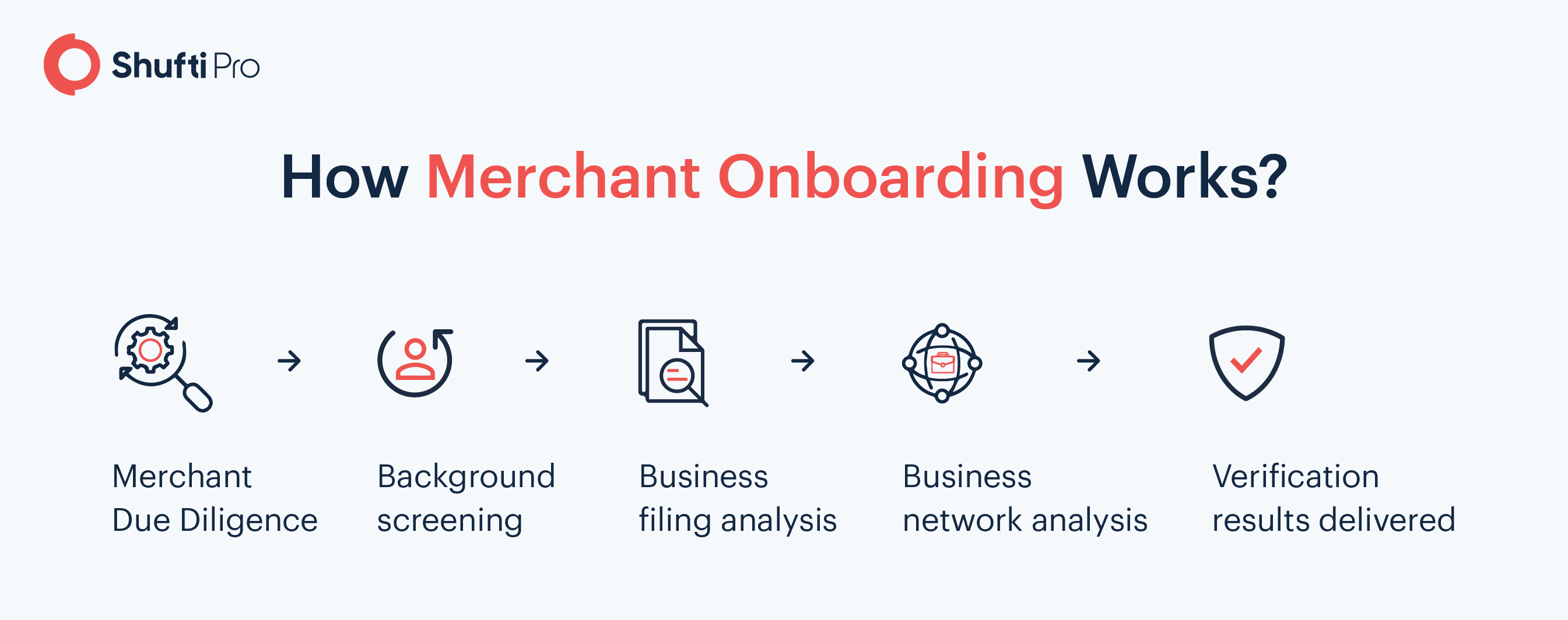Merchant Onboarding – Evaluating the Best Practices to Onboard Risk-free Partners

Partnering with the right people who can actually help your business grow is quite a tedious task these days. Perpetrators are everywhere, and you never know when a shell company gets in touch with you with a phenomenal investment plan, and once partnered, causes you to lose sensitive information A UK Finance report reveals that business fraud losses totalled $4.2 billion in 2020. The 2021 business fraud cases reported to various regulatory authorities indicate a sharp rise in fraudulent activities. On the contrary, regulatory authorities are working on imposing rigid regulations for onboarding legitimate suppliers and shareholders. Given these circumstances, we have a solution that can help you identify imposters in seconds. Read this blog to find out.
What is Merchant Verification?
Verifying corporate entities before partnering with them is referred to as merchant verification. Also known as Know Your Business (KYB) verification, the process screens intermediaries and shareholders against global watchlists to make sure the company is not dealing with any high-risk entity.
Regulatory Approach to Merchant Onboarding
Every region across the globe has a specific set of rules and regulations for businesses, and effective compliance with these regulations makes it easier to combat criminals. Here are some regulations from different corners of the world that must be considered while onboarding an intermediary, supplier or shareholder.
FATF’s Recommendations
As per the Recommendation 24 of the Financial Action Task Force (FATF), countries must undertake necessary Know Your Business measures to prevent the misuse of legal persons in money laundering and terror financing. Timely information about the ultimate beneficial owners (UBOs) must be obtained and reported to the relevant regulatory authority of the country. To meet all the FATF’s requirements, businesses can opt for one or more of the following mechanisms for UBO verification:
- Acquire registries of the company to get updated information on the beneficial ownership of the company (the Registry Approach)
- Companies can obtain updated UBO information on the other organisation’s beneficial ownership (the Company Approach)
- Employing existing information (the Existing Information Approach), including:
- Information that FIs and DNFBPs obtained following the Recommendation 10 and 22 (R.10 and 22)
- Information obtained by other authorities on the beneficial ownership of the company
- Information available on stock exchanges about the company
Suggested: 40 recommendations of FATF – Shaping the future of your business
6AMLD in the EU
The sixth Anti-Money Laundering Directive (6AMLD) holds employees and officials of the organisation, or any other person working on behalf of the company, liable for verification. Facilitating the illicit flow of funds will result in the entity to be criminally charged. Under the 6AMLD, the following are due diligence requirements that must be fulfilled:
- Identifying the beneficial owner and verifying the identity using legal documents, data or information acquired from independent and credible sources
- After identifying, taking reasonable measures to perform enhanced due diligence protocols in case of a high-risk entity is compulsory for the company
- Conducting ongoing monitoring of the corporate entity and maintaining updated risk profiles of the business entities is important
- Transactions must be regularly scrutinized throughout the business relationship to make sure transactions are consistently conducted
- Transaction monitoring must also verify the source of funds and the region they are being transferred to/from
Recommended: 6AMLD of EU – A detailed insight
Corporate Transparency Act in the US
The Corporate Transparency Act (CTA) directs the Financial Crimes Enforcement Network (FinCEN) to maintain a national record of the Ultimate Beneficial Owners (UBOs). Moreover, any changes in the UBOs must be immediately reported to the regulatory authority. The purpose of this act is to eliminate shell companies and financial crimes like money laundering and terrorism financing.
According to this Act, a beneficial owner is anyone:
- Who owns 25% or more equity shares in the company
- Has substantial control over the organisation
- Benefits from the company’s assets
Henceforth, verifying all these entities is important for the company. The Act categorises FATF’s recommendations regarding beneficial ownership for legal persons and as per the Act, the following information about UBOs must be reported to FinCEN:
- Date of birth of the owner
- Owner’s complete legal name
- Business address (residential is also acceptable)
- Unique identification number on the passport, driving licence or ID card
Apart from all these requirements, the company has to submit an annual report of the current UBOs along with any changes in the beneficial owner details.
Recommended: Corporate Transparency Act – The Road to Better AML Compliance
How Shufti is Helping Businesses Onboard Legitimate Merchants
Considering the significant increase in financial crime through shell companies, Shufti is assisting businesses in verifying other corporate entities like shareholders and suppliers. Know Your Business (KYB) verification is what companies need to combat the rapid increase in money laundering. The AI-powered KYB solution for businesses runs multiple background checks on a corporate entity. The identity is screened against 140+ global commercial registers and jurisdictions. With access to data of more than 200 million companies, Shufti provides 98.6% accurate business verification results in less than 30 seconds.

In a Nutshell…
FinCrime through shell companies and imposters has been a problem for the corporate sector for years. Money launderers that pretend to be potential investors and shell companies approaching with fascinating partnership opportunities has become the oldest trick in the book. Unfortunately, many companies still fall prey to these activities, resulting in hefty financial losses, exposure of confidential data, and a damaged brand reputation. With numerous laws in place to combat money laundering and terror financing, there must be an adequate solution in place for screening every entity before developing any business relationships. Shufti’s AI-backed business verification is what every firm needs at the moment. It will not only help you screen partners and intermediaries, but also assist you in staying compliant with the rigid KYB regulations.
Want to know more about how Shufti’s KYB solution works? Get your free trial right away!











